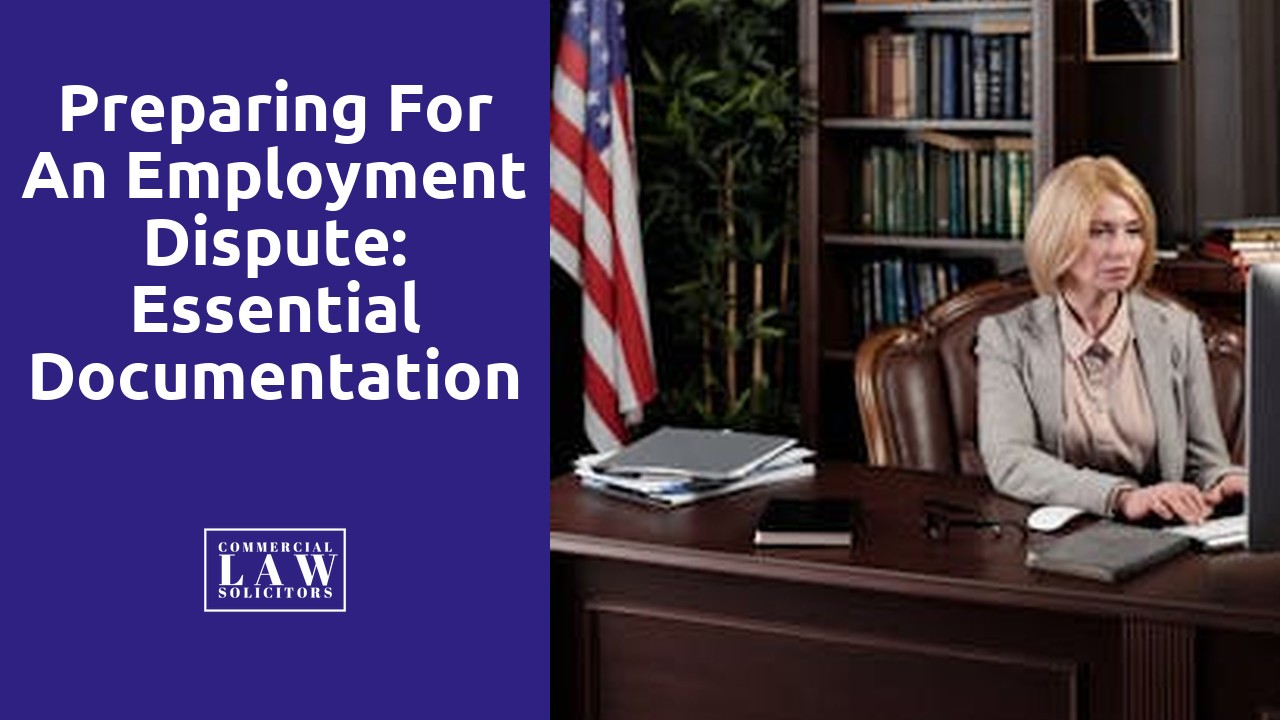Preparing for an Employment Dispute: Essential Documentation

Gathering Evidence to Strengthen Your Case
Gathering evidence is crucial in any legal case, and employment disputes are no exception. In order to strengthen your case, it is important to collect as much relevant evidence as possible. This can include documents such as emails, memos, performance evaluations, and any other written communication that pertains to your case. These written records can provide valuable insight into the events that have taken place and can help establish a clear timeline of the dispute. Additionally, gathering witness statements from colleagues or other individuals with knowledge of the situation can further strengthen your case.
Navigating the Legal Landscape of Employment Disputes
Navigating the legal landscape of employment disputes can be a daunting and overwhelming task. With complex laws and procedures, it is easy to feel lost and uncertain about the best course of action. However, with the right approach and guidance, you can successfully navigate through these challenges and protect your rights.
First and foremost, it is crucial to seek professional legal advice. An experienced employment lawyer can provide you with the expertise and guidance necessary to understand your rights, assess the strength of your case, and determine the best strategy moving forward. They can also help you navigate the legal complexities, such as filing necessary paperwork, meeting deadlines, and representing you in court if needed. By having a knowledgeable advocate by your side, you can feel more confident and empowered in your pursuit of justice.
Protecting Your Rights: Documenting Workplace Incidents
Documenting workplace incidents is an essential step in protecting your rights as an employee. Whether it's a case of harassment, discrimination, or any other violation, having solid evidence can greatly strengthen your case. When incidents occur, it is crucial to keep detailed records of what happened, including dates, times, and descriptions of the events. This information will serve as a written account that can corroborate your claims and provide a clear timeline of the incidents.
In addition to written accounts, it is also important to gather any supporting evidence that may be available. This can include emails, text messages, photographs, or any other documentation that directly relates to the incident. These pieces of evidence can be invaluable in proving the validity of your claims and demonstrating the severity of the workplace issue. Remember, the more evidence you have, the stronger your position will be when addressing the incident with your employer or taking legal action if necessary. By proactively documenting workplace incidents, you are actively working towards protecting your rights and ensuring that your voice is heard.
Understanding the Importance of Written Contracts and Agreements
Written contracts and agreements play a crucial role in protecting your rights and ensuring that all parties involved in a business relationship are on the same page. One of the key advantages of having a written contract is that it provides a clear record of the terms and conditions agreed upon by both parties. This serves as a reference point and can help prevent misunderstandings or disputes that may arise in the future. By having a written document that outlines the rights, responsibilities, and obligations of each party, you can establish a solid foundation for a successful working relationship.
Additionally, written contracts and agreements also provide a legal framework that can be enforced if any party fails to fulfill their obligations. In the event of a breach of contract, having a written agreement can make it easier to pursue legal action or seek compensation for any damages incurred. While verbal agreements may hold some weight in certain situations, they are much more difficult to prove in a court of law. Therefore, it is always advisable to have any important business arrangements documented in writing to protect your rights and interests.
Building a Timeline: Documenting Key Events in Your Employment Dispute
Building a timeline is a crucial step in documenting key events in your employment dispute. By creating a timeline, you can organize and present a clear narrative of the events that have occurred. This timeline will serve as a chronological record of important dates, conversations, and incidents that are relevant to your case.
Start by gathering any written documentation related to your employment, such as contracts, emails, or performance reviews. Review these documents carefully to identify any significant events or actions that have taken place. Take note of the dates, times, and individuals involved in each event. Additionally, consider any witnesses or evidence that may support your claims.
The Power of Written Communication: Keeping Records of Correspondence
In today's digital age, written communication plays an essential role in our everyday lives. Emails, text messages, and online messaging platforms have become the primary means of communication. In the context of employment disputes, keeping records of correspondence is crucial. These records serve as crucial evidence in strengthening your case and ensuring that your rights are protected.
When documenting workplace incidents or communication with your employer or colleagues, it is important to maintain a professional tone. Clearly and concisely articulate your concerns or issues while refraining from crossing the line into personal attacks or inflammatory language. By doing so, you not only maintain your credibility but also increase the chances of reaching a resolution amicably. Additionally, keeping thorough records of all communication allows you to have a clear and accurate account of events, which can be invaluable in the mediation or litigation process. Whether it is in the form of emails, text messages, or even handwritten letters or memos, preserving a paper trail of correspondence is a powerful tool in any employment dispute.
Related Links
Proving Wrongful Termination in an Employment DisputeCommon Issues Arising in Employment Disputes
Expert Witnesses in Employment Disputes: Their Role and Importance